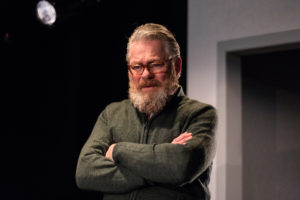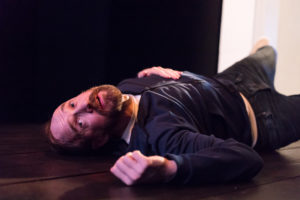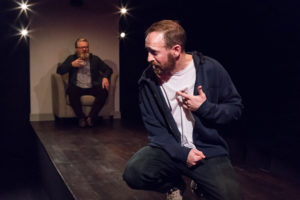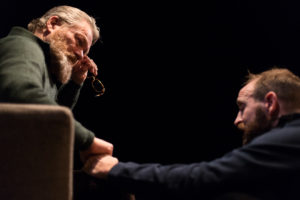 (3 / 5)
(3 / 5)
I have always struggled a little with the plays of Caryl Churchill and the Welsh premiere of A Number at The Other Room, Cardiff continues this trend. I find her admirable in her dramatic innovation but she never seems to engage me emotionally.
However, her reputation as one of Britain’s leading dramatists makes this presentation in Cardiff’s only pub theatre, a noteworthy event.
First performed at that bastion of post WW2 British theatre writing, The Royal Court, in its main auditorium in Chelsea, on 23 September 2002, this two-handed play, directed by Stephen Daldry, (whom many years ago I shared the experience of being locked out of the first act of a play at The Young Vic until the end of the first act – I think we must have been on the same Tube train!), starred Michael Gambon as the father Salter and Daniel Craig playing three of his sons.
The programme notes to production under review, describes the play as, “a fearless and affecting dissection of the relationship between father and son, A Number strikes at the heart of what it is to love unconditionally – and the tragic failure to connect”. Whilst this is true, I understand the play to be more about human identity, brought into moral and ethical questionability through the instrument of cloning. A fundamental criticism of cloning is that it turns humans into commodities such as in this case, replacing a dead loved son. The cloned have a feeling of a lack of uniqueness inevitably resulting in a lack of identity.
The intellectual premise of the play is largely influenced by the philosophy of Ludwig Wittengenstein, whom the playwright has, in more recent times, returned to in her 2012 play Love and Information. Wittgenstein’s thesis is that a word, taken by itself, could have meaning without the existence of other elements that determines its character. These entities, he states, may not be the same, but upon closer analysis can reveal a pattern of similarity, “a family resemblance”. Therefore, Wittgenstein allows us to speak in a meaningful way about things and people without reverting to essentialism – a belief that things have a set of characteristics which make them what they are, thereby providing the essence of Churchill’s statement in A Number on identity.
The play is in five scenes, with the father Salter, a manipulative and deceitful man, and three of his cloned sons, all played by the same actor.
This production of A Number is directed by Ed Mannon and is performed by Brendon Charleson as the father Salter, and Stevie Raine as three of his sons.
An enduring problem at The Other Room’s small space is set design. In the original production in the Royal Court’s main house, designer Ian MacNeil, (who together with Caryl Churchill won Evening Standard awards for this production), devised a blank set, a rectangular platform above the stage, devoid of decor other than two chairs and an table carrying an ashtray, thereby heightening the lack of context for Salter’s filial visitations. For this production, designer Carl Davies, has designed a site-specific staging with a kind of thrust stage that runs the entire length of the space, bisecting the audience into two equal halfs facing one another in a semi theatre- in- the round way. This heightens the feeling of intimacy between the actors and the audience and works well. On the one end of the stage there is an easy armchair, with the entrance facing it at the opposite side.
Brendon Charleson, (who incidentally played in the first ever production at the Sherman Theatre), and comparative newcomer Stevie Raine do well in their roles, and their timing, (which is a very important part of Churchill’s writing style), was largely maintained.
The production is an admirable effort in introducing this important 21st century British dramatic work to the Welsh public and deserves to play to good audiences, although, like me, you may come away feeling emotionally empty.
A Number runs at The Other Room, Cardiff until 3rd March 2018. For timings and tickets, https://www.ticketsource.co.uk/otherroomtheatre
Duration: 1 hour without an interval.
Suitability: All (a few instances of persuasive language)
All photo credits Kiernan Cudlip
Roger Barrington






